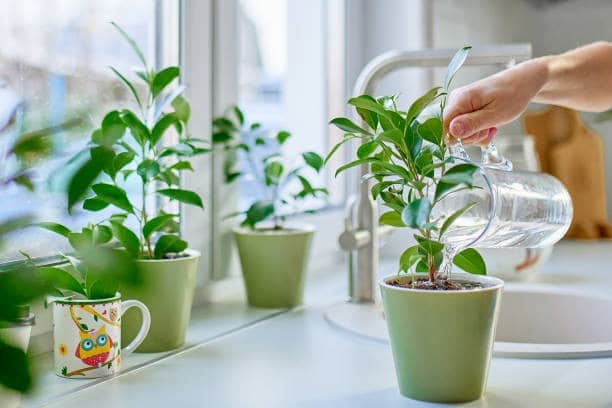Water is a fundamental contributor to plant growth and health. It’s common to use tap water for plants without considering its quality, which can sometimes do more harm than good. On the other hand, filtered water can better nourish plants and soil. Let’s explore the contaminants affecting plants, why purified water is better, and ideal filtration options.
The Problem With Tap Water
Although many use regular water for watering plants, it often has chemicals, additives, and impurities that can accumulate and damage plant tissues. Some of the most common contaminants include:
- Heavy Metals—Water running through old pipes or municipal water sources often contains lead, copper, and other metals. These pollutants tend to build up in the soil and become toxic to plants over time.
- Fluoride—Plants like bamboo, palms, peace lilies, and spider plants are particularly sensitive to fluoridated water. Even if the fluoride content is minimal, it can cause leaf tips to burn and change color.
- Chlorine and Chloramine—These chemicals are often infused into municipal water supplies to kill bacteria. However, they can also harm the beneficial soil microbes that plants rely on to absorb nutrients.
- Chemical Residue—Sometimes, pesticides, herbicides, and other chemical formulas leech into tap water. These substances can hinder plant growth and compromise their health.
- Excess Minerals—Hard water, which contains high levels of calcium and magnesium, can cause buildup in the soil and prevent plants from absorbing essential nutrients.
Why Go for Purified Water
Since tap water can contain any of these pollutants, it’s best to filter the water you’ll use on your plants. Doing so lets your plants absorb nutrients and moisture effectively and reduces the risk of contamination in the root system and soil. Removing salts and nonessential minerals from water also helps maintain the ideal soil structure, pH level, and nutrient balance. Ultimately, using filtered water for plants ensures you’re creating the optimal environment for their growth.
Recommended Water Filtration Methods
There are many ways to treat water, each involving varying processes, technology, and filter types. However, two filtration techniques are the most effective options for plants.
The most ideal method is reverse osmosis, which eliminates nearly all impurities in water through a series of semi-permeable filters. However, it also strips the water of minerals that nourish plants. So, consider getting a reverse osmosis system featuring remineralization technology.
Alternatively, you can use activated carbon filters. They are available as countertop and under-sink attachments or whole-house systems. These use a charred, highly porous substance to collect contaminants, including chlorine, chloramine, and organic compounds, as water passes through.
Switch from Tap to Purified Water
Filtered water is safe to use for improving your plants’ health and longevity. Without harmful contaminants, you can give your plants the best possible care and see them grow lush foliage and vibrant blooms. Explore water treatment solutions today from Adams Water Conditioning, your partner in clean and safe water in Ocala, FL.



